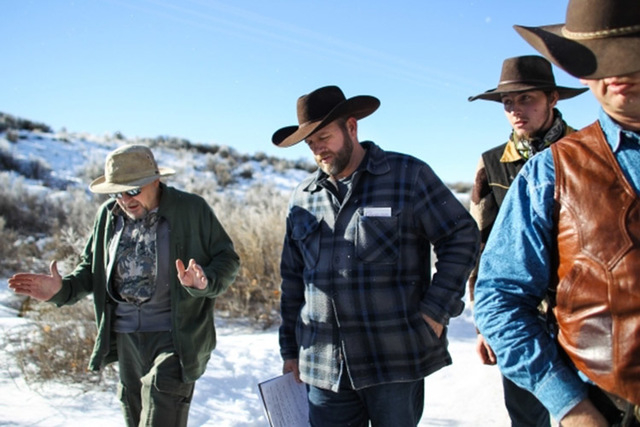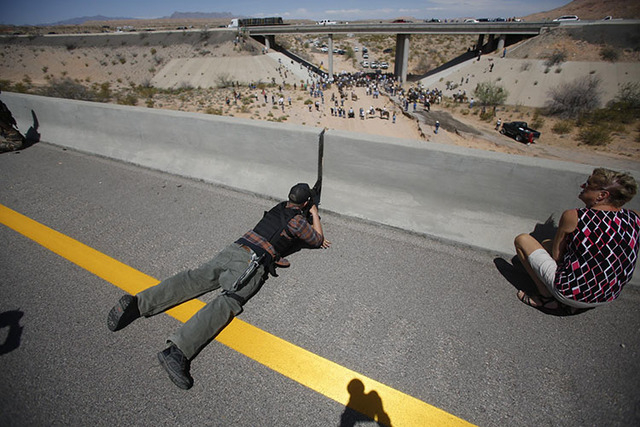Trump sweep of GOP field deflates federal land transfer push
CHEYENNE, Wyo. — Donald Trump’s apparent lock on the Republican presidential nomination means advocates of large-scale transfers of federal lands to states in the West likely won’t find support in the White House regardless of who wins election in November.
Neither Trump nor Democratic candidates Hillary Clinton and Bernie Sanders favor the wholesale transfers of federal lands, according to advisers and the candidates’ prior statements.
However, chief policy adviser Sam Clovis said Trump wants to see policy changes that give states and local governments more say in land management.
“All of us involved in the campaign believe in conserving the property,” Clovis said. “But there are also uses for the property that can benefit all concerned and benefit the common good, which is essentially what we need to do.”
According to a recent federal report, the federal government owns nearly 47 percent of the combined land mass in 11 Western states: Arizona, California, Colorado, Idaho, Montana, Nevada, New Mexico, Oregon, Utah, Washington and Wyoming.
The federal government owns 81 percent of the land in Nevada, the highest percentage of any state. The issue has flared up in controversies for decades.
In 2000, hundreds of protesters from across the West and the nation, armed with picks and shovels, turned out to rebuild a washed-out road in a national forest along the Nevada-Idaho border after the U.S. Forest Service sued Elko County over the threatened bull trout.
In 2014, supporters of Bunkerville rancher Cliven Bundy converged in Southern Nevada to halt a Bureau of Land Management roundup of Bundy’s cattle for failure to pay grazing fees for 20 years. The BLM abandoned the roundup after it was confronted by armed militia members in an intense standoff near a freeway overpass.
In 2015, the Nevada Legislature approved a resolution urging Congress to transfer millions of acres in Nevada back to the state.
Supporters of transferring federal lands to states say it would give local officials who know the most about the land control over management decisions. And they say it would create better conditions for economic development.
The issue turned violent earlier this year when activists upset by federal land policy and the imprisonment of two ranchers staged an armed takeover of the Malheur National Wildlife Refuge in Oregon. One of the activists was killed by law enforcement and others, including Ammon Bundy, Cliven Bundy’s son, are facing criminal charges.
Trump supports “shared governance” of federal lands between federal agencies and state and local governments in many circumstances, Clovis said. Under such management, he said state and local government would benefit from better access to minerals on federal lands and would retain revenue coming off the properties above what’s required for maintenance of the land.
“The whole federal land issue is one where we can preserve the sportsmen’s access to that land, we can preserve grazing land, and at the same time we can get to a shared governance structure on other aspects of that where state and local governments can benefit from access to minerals, from access to other things,” Clovis said.
In instances where growing cities are hemmed in by federal lands, Clovis said Trump supports easing the transfer of federal lands to state and local governments to allow development.
Trump supports the transfer to local and state government when it is appropriate and when proper stewardship is guaranteed, Clovis said, adding “Congress needs to get on board with that.”
Clinton and Sanders, meanwhile, are both on-record opposing transfers of federal lands to the states.
“We need to preserve existing public lands and add more public lands,” Clinton said at a press conference last fall in Nevada. “But we certainly should not be giving in to this ideological argument from the right that we need to put more public lands in private hands. I don’t agree with that.”
U.S. Sen. Martin Heinrich, a leading opponent of the land-transfer movement, said culturally conservative groups such as hunters and anglers increasingly are rallying against the idea. Transferring federal lands to states would threaten public access that those sportsmen rely on, the New Mexico Democrat said.
“It really is a bait-and-switch when you think about how many millions of acres a lot of these state lands offices have sold off over the years,” Heinrich said.
Review-Journal writer Sandra Chereb contributed to this report.





























